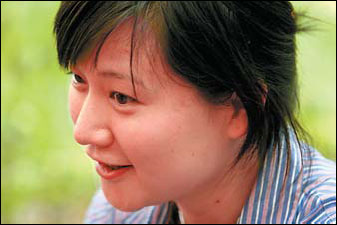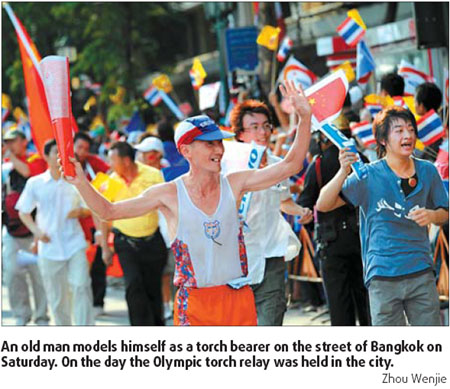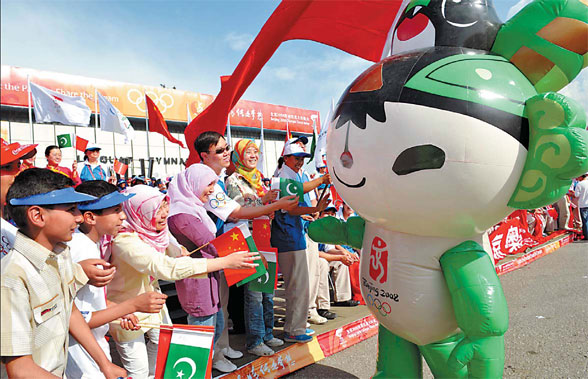Shaping a dream
|
People welcome an Olympic mascot at the torch ceremony in Islamabad, Pakistan on April 16. An Zhiping |
When the International Olympic Committee (IOC) assigned her to direct the Olympic Games' official film one year ago, Gu Jun did not feel overwhelmed.
She was prepared. For the past seven years, the 41-year-old has been working on a documentary Dream Making 2008 (Zhu Meng 2008), which shows how the Chinese are preparing for the Games. It was the experience of making this film that won her the 2008 Beijing assignment.
"If Dream Making 2008 is about the build-up to the Games, the official film is all about the participation," Gu says, explaining the different approaches of the two films.
The tradition of documenting the Olympic Games dates back to the 1912 Stockholm Games. Each Olympiad adds an official film to the growing library at the IOC headquarters in Lausanne, Switzerland.
Gu started filming on August 5, 2007 and will wrap up after the Games end this summer. The film will include important moments, such as the torch relay, the opening and closing ceremonies, and stories of six athletes. The events to be held over the 16-day Game period will also form an important part of the film.

Before 1984, TV broadcasting was not as effective as it is today, so most official films focused on the sporting events. Story-telling, however, has developed over the past 20 years, with the live telecast of the Games.
Dream Making 2008 also focuses on human-interest angles. With the construction of the National Stadium forming the main storyline, Gu tells the tale of five groups of ordinary folk, including a family who lived in Walixiang, the current location of the National Stadium. The family comprised an elderly woman, her son and her pregnant daughter-in-law. When the family had to move to make way for the stadium, the old woman expressed her unhappiness. But the young couple saw a chance to move into a bigger and better residence.
Gu's camera records the family's different attitudes to the big changes the Olympics was bringing into their life. When Gu receives a call from the husband, informing her of the baby's imminent birth, Gu and her team rushed to hospital, waiting until 1 am to capture the first cry of the baby.
The other four groups examined in the film are construction workers, volunteers, security staff and athletes.
"It is the details of the life of common people that make a moving film," says Gu, now a director at the Central Newsreel and Documentary Film Studio, the principal base for documentary production on the Chinese mainland.
The official film has plenty of interesting stories, too. Gu and her 60-strong team have just ended a two-week shooting stint around the world, to get behind the lives of 18 athletes. Six of them will appear in the final cut, and will include Chinese hurdler Liu Xiang and basketball star Yao Ming.
Gu says what impressed them most on their journey was the passion for the Olympics.

At Sweden, one of the stops, they received a cordial welcome. The local government held a press conference, because media were eager to communicate with the team. The swimmer they went there for was also very cooperative. He was with Gu's crew all the time, ready for the camera at short notice. His family, friends, teammates and coaches, all offered warm help and cooperation.
Talking about some unpleasant events during the global torch relay recently, Gu attributes them to lack of knowledge about China.
"Some of them know very little about China," she says. "Their impression about the country is based on what it was hundreds of years ago. If they knew China better they would have a totally different idea."
Gu is inviting Japanese composer Shigeru Umebayashi, who scored Zhang Yimou's House of Flying Daggers (Shimian Maifu) and Wong Kar-wai's In the Mood for Love (Huayang Nianhua) and 2046, to compose for Dream Making 2008. After seeing the two-hour-long film, Umebayashi said: "Your film needs no music to touch me."
"Umebayashi said he was moved by how much effort the Chinese people have put into preparing for the Games," Gu says. "The only wish after seeing the film, he said, is to see China host the 2008 Olympics successfully."
The biggest difference between Gu's work and other official films, she says, is that the spotlight falls not only on the 16-day games and stories of athletes, but also on the countless people who have offered their support.
For example, on the segment covering the bicycle race, the film dwells on how the transportation department guaranteed the availability of roads.

Gu says she will not add oriental elements to the official film just for the sake of underscoring that it is a Chinese film.
"I would like to combine elements from different cultures," she says. "Think of the National Stadium, or Bird's Nest. It is a very modern, avant-garde architecture, but part of the inspiration comes from the cracks on Chinese porcelain and old window frames, both of which are all very traditional Chinese elements."
Dream Making 2008 will premiere in China in June, while the 120-minute official film will hit theaters nationwide around March 2009. Gu hopes these works can be shown to people around the world.
"For me, the Olympics is a big, big party we Chinese people are hosting," she says. "It is the Chinese tradition to make our guests happy. However busy the preparations get, we will be happy if our guests have a good time. My films will show how happy both the host and the guests are before and at the big party."
(China Daily 04/22/2008 page18)















